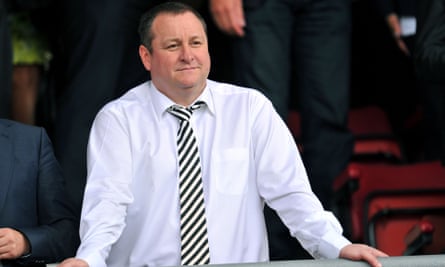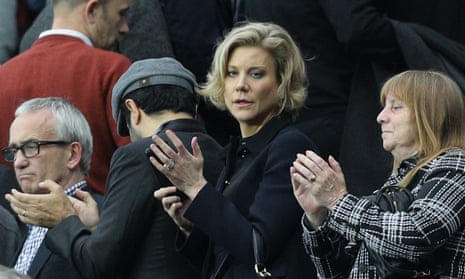A guide to how swimmingly Mike Ashley’s sale of Newcastle United has been proceeding is that he decided to broadcast an advert for it so publicly. The announcement last Monday by the Sports Direct baron, owner of the north-east football institution for a turbulent and occasionally hapless decade, was the corporate equivalent of hammering an estate agent’s sign into the pitch at St James’ Park.
In June, Ashley did not move to deny reports that a Chinese consortium was interested in buying the club, itself taken as a public signal that he wanted to sell. But nothing appears to have come of that talk, so Ashley remained in place through a summer transfer window not marked by notable enthusiasm at his club having been promoted convincingly back into the Premier League. Ashley gave one of his rare, but more frequent, interviews in early August, explaining himself as a billionaire in Sports Direct share price only, without the ready cash to finance spending on players that could push Newcastle into competition with the mega-wealthy top clubs.
Newcastle spent £29m net, finally, on players, including Jacob Murphy from Norwich and Florian Lejeune from Eibar, while missing out on bigger and more pulse-quickening names. Now that Rafa Benítez has taken his team up to sixth, at least for 24 hours, with Saturday’s win against Crystal Palace, Ashley has stuck his placard up, desperately seeking a buyer.
Information was then released that four parties, so far unnamed, had signed non-disclosure agreements to inspect the club’s prospects, and Ashley’s lawyer, Andrew Henderson of Dentons, said: “A number of additional parties have come forward which we believe to be credible.”

Amanda Staveley, the Dubai-based manager of the PCP Capital investment fund, is now reported to have followed her appearance at Newcastle’s home 1-1 draw with Liverpool on 1 October by signing an NDA. People working with Staveley have suggested that she is generally interested in buying a Premier League club and increasingly taken with Newcastle’s attractions, but she is in the same position as the “additional parties”: having an initial look, a long way yet from making a bid.
The possibility of Chinese investors is limited by government restrictions in China following the great rush that led to Aston Villa, Birmingham City, Wolverhampton Wanderers and West Bromwich Albion being bought last year. US sports investors are still broadly interested, with major stakes having been bought recently in Swansea, Crystal Palace, Bournemouth and Portsmouth, but they tend to look at making money by paying an economic price for clubs that have a significant medium-term prospect of gaining in value.
From one perspective, Newcastle look like one of English football’s great prizes, as they did when Ashley bought them, seemingly on something of a whim after floating Sports Direct and first becoming a paper billionaire in 2007. The club are storied, as the Americans say, four-times Football League champions between 1905 and 1927, and now have a 52,000-seat redeveloped stadium, crammed with a passionate Toon Army hungry for good times to return.
Yet those same attributes also add up to a great deal of money an investor would have to pay. Ashley is apparently looking for between £350m and £400m just to buy the club, without factoring in any spending for Benítez, which would have to be a significant sum or risk stagnation and further alienation of the supporters.
Ashley is signalling that he would accept the money in instalments to get a deal – but it would still be a significant profit. He paid £134m for the club, principally to Sir John Hall, who was a willing seller, himself making a huge profit on owning Newcastle shares into the Premier League era, and the late Freddy Shepherd, who was not happy to sell and would have liked to remain involved.
Ashley found that Shepherd and Hall’s regime, while successfully redeveloping St James’ Park, had nevertheless borrowed significantly to try to keep up with the escalating spending on players and wages by other clubs, and Ashley has loaned £129m, interest free, to clear that debt. His loyalists feel that he has not been given much credit for that, or for the club’s efficient financial running, and that he has taken nothing out, unlike the Halls and Shepherds, who pocketed huge money in salaries and dividends even before cashing in mightily by selling to Ashley.
Nevertheless, £380m, if that is what Ashley is looking for, would be a gain of £117m on the £263m outlay on the club and loans. Ashley has said that when he floated Sports Direct, which he wheeled and dealed to high-street dominance with relentless cost-control including widespread use of zero-hours contracts, he did not know what to do with his new fortune. His early drinking and sitting with supporters, and the collection of friends and associates running the club, suggested he bought the club for rich man’s fun, but Kevin Keegan’s exasperated walkout in 2008, relegation the following season and a bitter backlash drained the joy out of it.
When he put the club up for sale in 2009 there were no takers, so he was said to have decided to do his best with it, this time treating it as a business like all the other brands in his Sports Direct agglomeration.
Newcastle had seemed to hit on a winning formula in 2011-12, signing excellent players from France for good value, and a richly talented, exciting team finished fifth that season under Alan Pardew. Yet even that brief highlight of the Ashley era now has a taint hanging over it, subject to a criminal investigation by HMRC, alleging systematic tax fraud. In a judgment this month rejecting Newcastle’s objection to HMRC’s raid on the club in April, the high court confirmed that the signings of Demba Ba, Sylvain Marveaux, Moussa Sissoko, Davide Santon and Papiss Cissé are all under investigation, and outlined that the Ba inquiry concerns £1.9m paid to an agent, Simon Stainrod, which was then passed on to other parties.
Ashley festooned St James’ Park with billboards for Sports Direct, and the club signed a widely criticised shirt sponsorship deal with Wonga, even before another relegation, in 2016, cemented his unpopularity with supporters.
Now, having himself explained and illustrated the limitations of Newcastle’s potential compared to the richest clubs, Ashley is hoping that somebody will pay him the big fee and take it all on.
